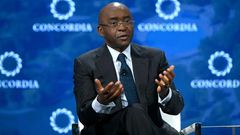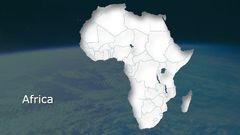Across Africa, private wealth distribution is undergoing seismic changes—charting a path not just of growth, but of adaptation in the face of shifting global and local realities. Buoyed by robust financial reforms, a rapidly innovating entrepreneurial spirit, and broader access to investment opportunities, more Africans are joining the ranks of the continent’s affluent than ever before. For Nigerian readers, these shifts carry significant lessons and opportunities, especially as local and regional economies position themselves for a new era of prosperity.
According to the 2025 Africa Wealth Report by Henley & Partners in collaboration with New World Wealth, wealth remains concentrated in specific regions, yet the story of Africa’s top earners is one of evolution, ambition, and economic transformation. The report highlights not only where affluent communities are growing but also how these individuals are reshaping investment, policy, and even cultural landscapes throughout Africa.
This comprehensive review divides Africa’s wealthy into two primary segments: millionaires with at least $1 million in investable assets, and centi-millionaires holding more than $100 million. These two groups are more than just financial statistics—they are the founders, job creators, and policy influencers shaping the economic future of their countries, including Nigeria and Ghana.

Beneath the numbers lies an even more dynamic narrative. Africa’s millionaires—whether operating in natural resources, rising real estate, bustling financial services, manufacturing, or the fast-growing tech space—reflect the continent’s unique economic engines and its resilience in adapting to change. Recent trends show that many are moving beyond traditional wealth sources, investing in emerging industries like renewable energy and digital banking.
Nations that top the continent’s wealth rankings—such as South Africa, Egypt, Morocco, Nigeria, and Kenya—are not just large. They’ve implemented stable governance, established sophisticated banking systems, and encouraged forward-thinking business policies. These conditions have proven essential for nurturing wealth and ensuring it remains within their borders, a central concern for many Nigerians following recent currency and policy uncertainties.
On the other hand, countries plagued by currency issues, limited financial markets, or inconsistent leadership tend to see their affluent citizens relocating abroad and their capital flowing out of the country. According to Lagos-based financial analyst Oluwasegun Adeyemi, “Capital flight is a real risk wherever investors don’t feel safe. Without trust in the system, wealth finds more secure homes elsewhere, which is a lesson for Nigeria’s policymakers as they structure economic reforms.”

Southern and Northern African regions have historically served as strongholds for private wealth on the continent. South Africa, with its established financial services sector, mature infrastructure, and vibrant private enterprises, remains the continent’s financial powerhouse. A trend, according to economic observers, that remains steady even as new players emerge elsewhere.
Egypt, Morocco, and Mauritius are climbing the wealth ladder thanks to far-reaching economic reforms, sustained foreign investment, and strategic diversification. Morocco, in particular, has ramped up its focus on renewable energy and tourism, while Mauritius is positioning itself as Africa’s banking and financial services hub. Economic diversification, experts say, has been at the heart of their persistent success and increasingly stable environments.
The story is different—but equally compelling—in East and West Africa. Fast-growing economies such as Kenya, Ghana, and especially Nigeria are creating new wealth through bold entrepreneurship, innovation in technology, and a youthful, urbanized population. Sectors like fintech, agri-tech, and clean energy are now driving the rise of the region’s latest millionaires. Lagos, Accra, and Nairobi are all considered regional innovation capitals, with policies that nurture startups and attract local and diaspora investors, as noted by the Nigerian Startup Ecosystem Report 2024.

Another notable trend in the 2025 report is the migration of private wealth. Smaller nations, or those once overlooked, are now emerging as attractive destinations for high-net-worth individuals. Political stability, tax incentives, and improved quality of life are drawing more millionaires to countries like Mauritius, Rwanda, and Botswana. This “new wave” of wealth migration is also prompting Nigeria and Ghana to reevaluate their economic attraction strategies to keep homegrown capital from moving abroad.
Mauritius provides a remarkable case study, having deliberately grown its finance sector and built a strong reputation as a trustworthy regional hub. North Africa, on the other hand, has continued to use its links to Europe and Asia to drive trade, increase investment flows, and diversify economic activity. Meanwhile, East Africa is capitalizing on infrastructure upgrades and intra-regional partnerships to further boost its competitive edge.
Despite some temporary downturns in millionaire populations in a few countries—often the result of economic shocks or political unrest—the overall forecast for African wealth creation remains optimistic. The continent’s demographic profile, characterized by youth and rapid digital adoption, offers significant potential for further growth.
However, there are real headwinds. Persistent inequality, institutional weaknesses, and uneven infrastructure development stand as obstacles. As noted by Abuja-based economic commentator Chinedu Okeke, “How Nigeria manages to bridge the gap between its urban millionaires and rural poor will be the true test of inclusive development.”
The Africa Wealth Report 2025 offers more than just numbers—it captures the drive and adaptability shaping Africa’s growth story, from Lagos to Marrakech and beyond.

Curious about where wealth is most densely concentrated? The table below ranks the top ten African nations by their numbers of millionaires and centi-millionaires. Nigeria, Ghana, and Kenya sit among other regional giants—demonstrating both the concentration and the future potential of Africa’s expanding wealth base.
|
Rank |
Country |
Millionaires (USD 1m+) |
Centi-millionaires (USD 100m+) |
|---|---|---|---|
|
1 |
South Africa |
41,100 |
112 |
|
2 |
Egypt |
14,800 |
49 |
|
3 |
Morocco |
7,500 |
35 |
|
4 |
Nigeria |
7,200 |
20 |
|
5 |
Kenya |
6,800 |
16 |
|
6 |
Mauritius |
4,800 |
14 |
|
7 |
Algeria |
2,700 |
10 |
|
8 |
Ghana |
2,600 |
8 |
|
9 |
Ethiopia |
2,400 |
7 |
|
10 |
Namibia |
2,500 |
4 |
The distribution of wealth in Africa raises vital questions not just for policymakers but also for young entrepreneurs, business leaders, and families looking to secure their financial futures. As Nigeria and its West African neighbors continue to advance, their ability to foster a climate where private wealth can be created—and more importantly, widely shared—will remain central to the region’s story in the coming years.
How do you think Nigeria and West Africa can build on these trends to ensure wealth benefits a broader segment of society? What steps could make wealth growth more inclusive and sustainable in your community?
Let your voice be heard!
Do you have an opinion, insider tip, or remarkable story on wealth, business, or trends across Nigeria and Africa? Get your story featured or discuss story sales by emailing us at story@nowahalazone.com. For general support or feedback, reach out to support@nowahalazone.com.
Connect, comment below, and follow us on social media for updates and deeper local stories:
Share your thoughts: Where do you hope to see Nigeria and its neighbors in the next decade for wealth growth and inclusion? Drop a comment!










